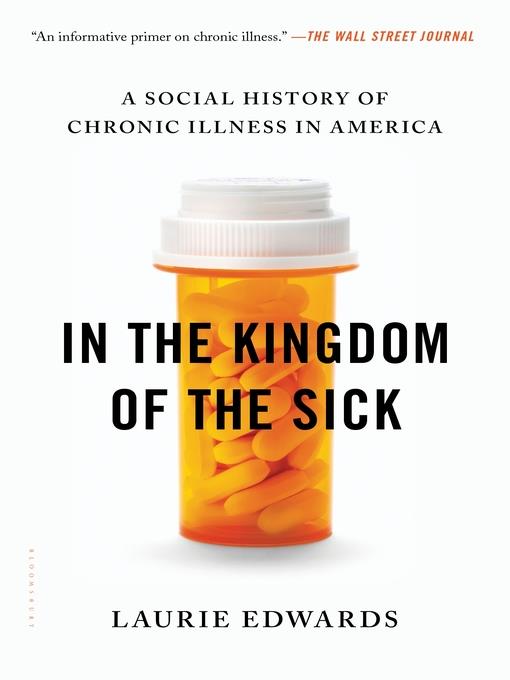
In the Kingdom of the Sick
A Social History of Chronic Illness in America
تاریخچه بیماریهای مزمن اجتماعی در آمریکا
کتاب های مرتبط
- اطلاعات
- نقد و بررسی
- دیدگاه کاربران
نقد و بررسی

November 12, 2012
With chronic ailments the new norm, people are fighting for their right to be ill, argues this wan exploration of evolving attitudes toward sickness. Edwards (Life Disrupted) surveys the battle of patients with intractable diseases against disparagement and misunderstanding, including AIDS patients deemed morally unworthy, diabetics blamed for unhealthy lifestyles, and breast cancer survivors who are lionized but also expected to remain cheerful and feisty. But she focuses on people who suffer from poorly defined maladies—chronic fatigue syndrome, chronic Lyme disease, fibromyalgia, and other kinds of persistent pain—that are often ascribed to stress, malingering, or feminine hysteria instead of biological causes. Edwards, who has celiac disease and lung disorders, mostly sides with patients against skeptics; she regales readers with her own and others’ stories of dismissive doctors and unsympathetic jibes, and situates their struggle for credibility within the patients’ rights movement and the Internet’s burgeoning ethos of do-it-yourself medical research and advocacy. She is more interested in activism against prejudice, sexism, and an arrogant medical establishment than in the lived experience of illness, and frequently glosses over scientific issues with anecdotes instead of rigorously analyzing them. One often feels that Edwards misses the heart of the medical problems she addresses. Agent: Matthew Carnicelli, Carnicelli Literary Management.

February 15, 2013
The story of "where attitudes about chronic illness came from, and where they stand today." Edwards, chronically ill with lung and autoimmune diseases (Life Disrupted: Getting Real About Chronic Illness in Your Twenties and Thirties, 2008), quotes Susan Sontag in describing herself: As a wife, mother and teacher, she behaves as if she were a citizen in Sontag's "kingdom of the well," but in truth, she belongs to the "kingdom of the sick," with daily needs of drugs and lung aids to enable her to breathe freely. And she is not alone. There are 133 million Americans living with chronic disease, which accounts for 75 percent of health care spending. The author offers a well-researched if somewhat overwritten study of how the current state developed, what it says about society and the medical profession, and how science and technology are forces for change. Her review of the past is an exercise in negativity. Societies faced diseases with fear, often isolating, condemning or stigmatizing the sick. With World War II medical advances came optimism: Antibiotics would eliminate infectious disease, for example--until they didn't. Nevertheless, doctors were respected, and Edwards writes that this was especially true in relation to female patients with chronic pain conditions. Even today, many doctors say that conditions like fibromyalgia, chronic fatigue or irritable bowel syndrome are "all in the head." That is changing with the growth of disease advocacy groups, new research and the wide use of social media. Many patient groups, writes the author, take inspiration from the civil rights movement or AIDS activists. But the problem for chronic-disease advocates is that the term encompasses so many problems that it's hard to strike a common agenda. Instead, Edwards argues for better-informed and -empowered patients and greater collaboration among scientists, researchers policymakers and patients. A timely call to attention to a global health problem, but with no real solutions in sight.
COPYRIGHT(2013) Kirkus Reviews, ALL RIGHTS RESERVED.

April 1, 2013
According to the Centers for Disease Control and Prevention, about 133 million American adults suffer from one or more chronic illnesses, ranging from AIDS to fibromyalgia to breast cancer. Edwards (writing, Northeastern Univ.; Life Disrupted) knows her topic all too well: she has, among other chronic conditions, a rare lung disease resembling cystic fibrosis. This work, the title of which owes a debt, as the author mentions, to Susan Sontag's Illness as Metaphor, is carefully researched, well written, and accessible to most readers. It is, as she states in the introduction, a "big-picture book" focusing on the "universal aspects of the circumstances" of chronic illnesses. Although much of the history covered in her first chapters treads familiar ground, it sets the stage for her focus on health care for chronic illnesses after the 1940s. Interviews with chronically ill individuals are included, and coping mechanisms are discussed, but this is not a how-to book. It is broader in scope than Melanie Thernstrom's The Pain Chronicles, which also includes the author's personal experiences and allusions to Illness as Metaphor. References come from a variety of journal articles and websites. VERDICT This is appropriate for academic and public libraries as well as history of medicine collections. Chapters on disability rights, the women's health movement, patient advocacy, and consumer empowerment will be of particular interest to both the interested layperson and the professional.--Martha Stone, Treadwell Lib., Boston
Copyright 2013 Library Journal, LLC Used with permission.

























دیدگاه کاربران